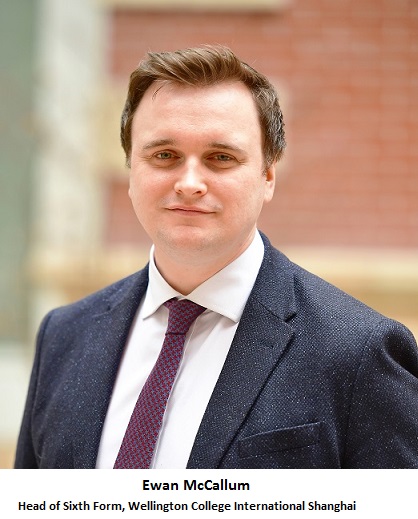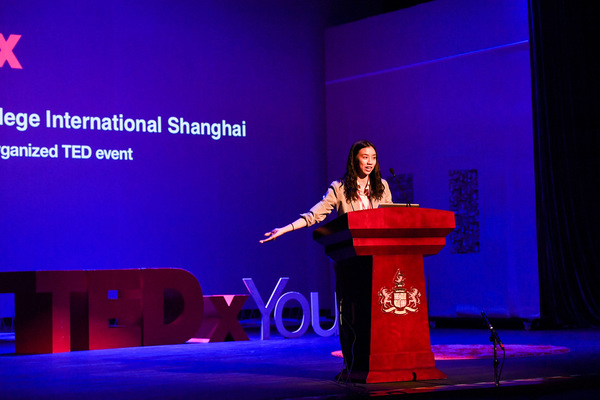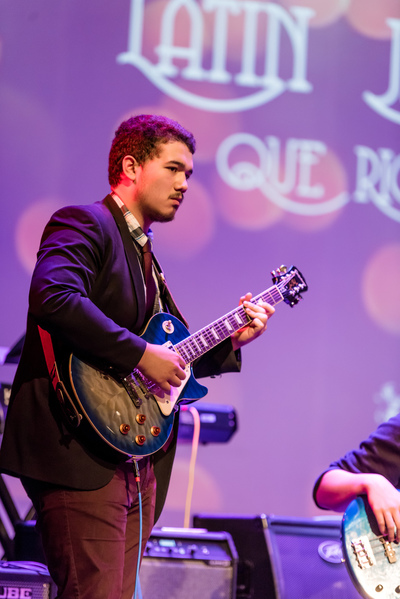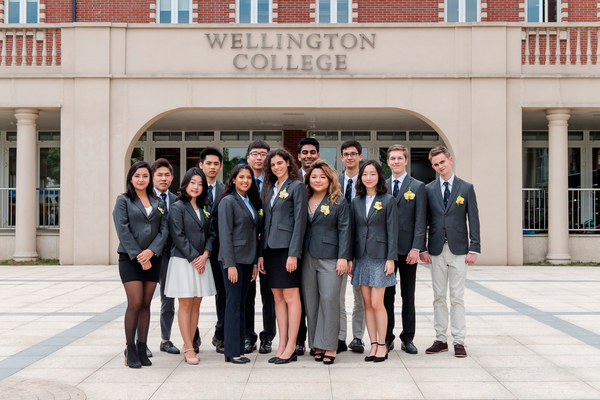Meet our head of sixth form
07 Mar 2018
 Ewan joined Wellington from the British International School in Washington DC where he was head of humanities and latterly head of professional learning. It is the International Baccalaureate Diploma Programme that initially drew him to international education, and he has taught history, theory of knowledge and global politics to this level. Before pursuing international education, Ewan took up his first post at John O’Gaunt School in Hungerford, Berkshire where he was head of history and head of year 11.
What attracted you to come to Wellington College International Shanghai?
I knew Wellington College UK and their fantastic reputation since I had already taught in Berkshire. However, it was the position as head of sixth form that really attracted me to come here. I think the IB is a phenomenal educational programme and it’s clear that Wellington is well placed to deliver it as successfully as possible.
Ewan joined Wellington from the British International School in Washington DC where he was head of humanities and latterly head of professional learning. It is the International Baccalaureate Diploma Programme that initially drew him to international education, and he has taught history, theory of knowledge and global politics to this level. Before pursuing international education, Ewan took up his first post at John O’Gaunt School in Hungerford, Berkshire where he was head of history and head of year 11.
What attracted you to come to Wellington College International Shanghai?
I knew Wellington College UK and their fantastic reputation since I had already taught in Berkshire. However, it was the position as head of sixth form that really attracted me to come here. I think the IB is a phenomenal educational programme and it’s clear that Wellington is well placed to deliver it as successfully as possible.
 What would you say is your vision for Wellington’s sixth form and what would you like to achieve as its head?
It’s clear that there are a number of elements that are already working extremely well in the sixth form. Looking at last year’s excellent IB results proves that; some of our scholars achieved scores that are among the best in the world. Therefore, it’s important that we reinforce these successes and not get complacent about refining our teaching approach to make sure that it stays relevant and effective.
In terms of future achievements, I think it’s important that we give our sixth form pupils every opportunity to become young leaders, both here in the College and beyond. Many of our sixth formers have the right balance of solid leadership skills and an appropriately kind and patient attitude that makes them suitable to take on mentoring roles to younger pupils. This isn’t the only way they can be leaders, of course, as they also have plenty of other opportunities to do so in academia, sports, the arts and formal positions of responsibility.
What would you say is your vision for Wellington’s sixth form and what would you like to achieve as its head?
It’s clear that there are a number of elements that are already working extremely well in the sixth form. Looking at last year’s excellent IB results proves that; some of our scholars achieved scores that are among the best in the world. Therefore, it’s important that we reinforce these successes and not get complacent about refining our teaching approach to make sure that it stays relevant and effective.
In terms of future achievements, I think it’s important that we give our sixth form pupils every opportunity to become young leaders, both here in the College and beyond. Many of our sixth formers have the right balance of solid leadership skills and an appropriately kind and patient attitude that makes them suitable to take on mentoring roles to younger pupils. This isn’t the only way they can be leaders, of course, as they also have plenty of other opportunities to do so in academia, sports, the arts and formal positions of responsibility.
 And how, specifically, will they be given the chance to show their leadership abilities and aptitudes?
Much of this process is now happening organically as sixth formers naturally gravitate towards helping and guiding their younger peers. I think Wellington’s house system is partly responsible for that, as pupils are drawn together across different age groups and are much closer because of it.
However, we will be actively encouraging year 12 and 13 pupils to try out mentoring roles more formally. For example, a year 12 who’s incredibly passionate about the guitar might take on the role of mentoring a year 9 pupil. My hope is that the sixth formers will be able to connect with younger pupils and bond with them over experiences like this. We’ve already begun looking at implementing mentoring initiatives, including a peer-driven reading programme which puts year 12 IB students together with year 6 pupils.
As well as mentoring, we want to empower the sixth formers to show their leadership in other ways. The College has already seen a number of extremely successful pupil-led, pupil-driven initiatives coming from the sixth form, such as last year’s Coin-a-thon and the Science Week workshops and lectures. Understandably, we want encourage and support this kind of original and ambitious thinking, so that our sixth formers feel comfortable coming to us and putting their ideas forward. We in turn need to do everything we can to help turn these ideas into realities.
And how, specifically, will they be given the chance to show their leadership abilities and aptitudes?
Much of this process is now happening organically as sixth formers naturally gravitate towards helping and guiding their younger peers. I think Wellington’s house system is partly responsible for that, as pupils are drawn together across different age groups and are much closer because of it.
However, we will be actively encouraging year 12 and 13 pupils to try out mentoring roles more formally. For example, a year 12 who’s incredibly passionate about the guitar might take on the role of mentoring a year 9 pupil. My hope is that the sixth formers will be able to connect with younger pupils and bond with them over experiences like this. We’ve already begun looking at implementing mentoring initiatives, including a peer-driven reading programme which puts year 12 IB students together with year 6 pupils.
As well as mentoring, we want to empower the sixth formers to show their leadership in other ways. The College has already seen a number of extremely successful pupil-led, pupil-driven initiatives coming from the sixth form, such as last year’s Coin-a-thon and the Science Week workshops and lectures. Understandably, we want encourage and support this kind of original and ambitious thinking, so that our sixth formers feel comfortable coming to us and putting their ideas forward. We in turn need to do everything we can to help turn these ideas into realities.
 Last year, Wellington saw its first group of year 13 pupils complete the IBDP and receive some excellent results. How are you planning to keep this momentum going as the sixth form grows in size?
It’s very important that as the sixth form grows we are still able to give each pupil the individual attention and guidance that they need in order to achieve their potential while enjoying their time at Wellington to the fullest. This is especially pertinent at the time when pupils are preparing for their exams while also making very important life decisions about their chosen path after school.
One key aspect of ensuring that each sixth former feels completely supported is how we maintain an open dialogue with parents. I believe that we need to be open and transparent with parents, and subsequently advise them how to help their children successfully manage these challenging tasks and decisions. However, it’s vital to strike a balance between being supportive while also remaining constructive in our guidance.
To that end, Wellington’s Wellbeing programme is an extremely helpful part of preparing our sixth formers for the rigours of IB, exams and university applications. It provides both pupils and their parents practical stress coping strategies, revision guidelines, advice on decision making as well as inviting pupils to explore larger ethical and moral questions with regard to their future choices. As the College and its sixth form grow, it’s critical that we use every tool at our disposal to support and challenge each pupil in our care and give them the best chance of success, personally and academically.
Last year, Wellington saw its first group of year 13 pupils complete the IBDP and receive some excellent results. How are you planning to keep this momentum going as the sixth form grows in size?
It’s very important that as the sixth form grows we are still able to give each pupil the individual attention and guidance that they need in order to achieve their potential while enjoying their time at Wellington to the fullest. This is especially pertinent at the time when pupils are preparing for their exams while also making very important life decisions about their chosen path after school.
One key aspect of ensuring that each sixth former feels completely supported is how we maintain an open dialogue with parents. I believe that we need to be open and transparent with parents, and subsequently advise them how to help their children successfully manage these challenging tasks and decisions. However, it’s vital to strike a balance between being supportive while also remaining constructive in our guidance.
To that end, Wellington’s Wellbeing programme is an extremely helpful part of preparing our sixth formers for the rigours of IB, exams and university applications. It provides both pupils and their parents practical stress coping strategies, revision guidelines, advice on decision making as well as inviting pupils to explore larger ethical and moral questions with regard to their future choices. As the College and its sixth form grow, it’s critical that we use every tool at our disposal to support and challenge each pupil in our care and give them the best chance of success, personally and academically. Related Articles

Get your tickets to our Little Mermaid Musical now!20 May 2025
Dive under the sea with our Year 5 and Year 6 cast in The Little Mermaid! Tickets are on sale now – and for a sneak peek, read on as we interview, Helen Heatley, Teacher of Drama & founder of Sunshin
Read More

Get your tickets to our Super Video Game Concert now!21 Mar 2025
Insert your token for the super sounds of the some of your favourite video games with our annual Secondary School Lent Term Concert! Join on 26 March us as our wind band, big band, orchestra, string
Read More

Who you’ll meet at our Primary Open House!21 Feb 2025
Alastair PhillipsHead of Primary It is my great pleasure to invite you to our upcoming Primary School Open House at Wellington College International Shanghai. Taking place on February 25, this will b
Read More










